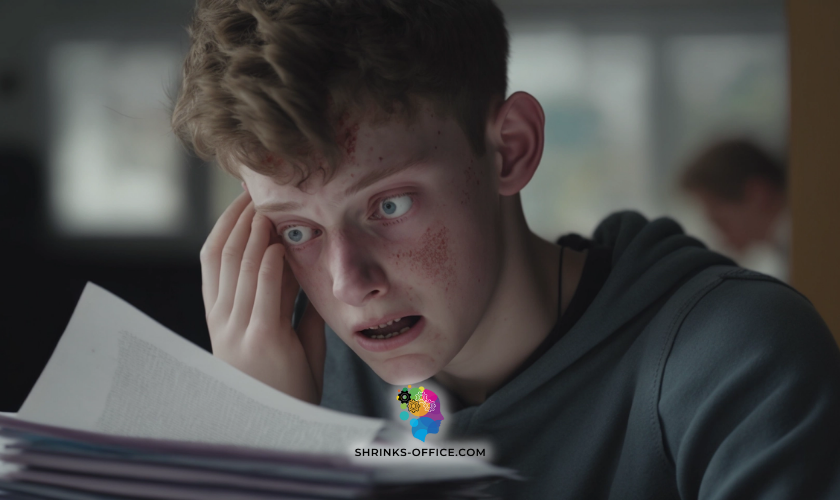Bionic reading transforms the reading experience for ADHD individuals by guiding the eyes for focus and understanding. Dive into the world of bionic reading.

- Recognizing that you are experiencing anxiety and acknowledging its impact on your life
- Learning about anxiety, its symptoms, causes, and treatments
- Developing healthy habits to manage your anxiety
- Practicing mindfulness techniques
- Gradually exposing yourself to anxiety-provoking situations
- Continuing to practice self-care, mindfulness, and exposure techniques
Anxiety is a normal human emotion that people experience in their life to varying degrees. However, some people may experience anxiety to an extreme extent which leads to serious physical and mental health issues. Fortunately, there is hope for people suffering from anxiety disorders because recovery is possible. This article will look at the six Anxiety Recovery Stages, which provide a helpful roadmap to healing and lasting relief from debilitating symptoms.

Anxiety defines a group of mental health disorders that can cause feelings of fear, worry, or unease. People with anxiety may experience intrusive thoughts and physical symptoms such as sweating, difficulty breathing, and increased heart rate. From mild to severe, anxiety can take on many different forms, including panic attacks, social anxiety disorder, and phobias.
Anxiety is the most common mental illness in the US, with about 40 million adults suffering from it [1]. According to NIH, anxiety disorders can disrupt a person's life by increasing the risk of substance abuse, alcoholism, major depression, and even cardiac arrests[2]. However, a few people try to recover from it. Mentioned below are the six stages of anxiety recovery.
Note: There is no certain order to these stages. Depending on the individual, recovery may take different paths.
Do our quick 10 question, convidential Anxiety tests and get a basic understanding of your current level of anxiety.

When discussing anxiety, it's critical to understand that its effects are not confined to occasional feelings of worry or stress. In reality, an anxiety disorder can permeate every aspect of a person's daily life, from work and relationships to physical health and personal well-being. Here's an in-depth look at how an anxiety disorder can impact various aspects of daily life.
Fun fact: Hormones that cause anxiety include cortisol and adrenaline, released during the fight-or-flight response, intensifying anxious feelings.
Anxiety can be incredibly distracting, making it hard to focus on tasks at hand. This could lead to decreased productivity, missed deadlines, or lower quality of work. An individual may find themselves constantly worrying, which diverts their attention from their responsibilities and duties.
The constant state of worry might also manifest in concerns about job security. A person with an anxiety disorder might constantly feel like their job is at risk, leading to additional stress and potentially exacerbating their condition.

Anxiety can lead to communication challenges in relationships. People with anxiety may struggle to express their feelings or needs effectively, leading to misunderstandings or conflicts.
In many cases, people with anxiety disorders may avoid social situations due to fear of judgment or criticism, leading to feelings of isolation and potentially straining relationships with friends, family, and partners.
Helpful tip: How to make friends when you have social anxiety - Start with small steps, join supportive groups or activities, and practice self-compassion to build connections gradually.
Anxiety isn't just a mental condition; it can also have physical symptoms. These can include heart palpitations, headaches, digestive problems, and insomnia. Over time, these symptoms can lead to more serious health complications.
Living in a constant state of worry or fear can be emotionally exhausting. This emotional drain can lead to other issues like depression, mood swings, or a general decrease in enjoyment of life.
People with anxiety disorders often neglect self-care. They might skip meals, have poor sleep habits, or not get enough physical activity. This lack of self-care can further exacerbate anxiety symptoms.
Here are some quick facts about the impact of anxiety on daily life:

The initial stage of anxiety disorder recovery involves wanting to recover the condition. In the first stage, those who are overwhelmed by anxiety symptoms will try to stop panicking and start accepting the reality of their situation. They realize however, that does not matter how hard they try, they can't control their problematic anxiety. Only then do they understand that they need help from mental health professionals and will start to look for one.
If your situation relates to this stage, consider yourself lucky, as only 36.9% of anxiety patients out of 19.1% population in the US actually seek help.[1]
In this phase, your mind resists the idea of getting help, and you might not be able to take your situation seriously or even see the need for help. You are afraid of what change your therapy could bring. However, you must move on if you want to recover.
The third stage of anxiety disorder recovery is ignoring the resistance of your mind and trying out anxiety medication given by the doctor. You might hesitate at first, but you eventually try to accept and follow through with treatment. This is a difficult stage for many patients as it usually involves confronting your fears and accepting your mental illness. This stage is so fragile that you may stop taking medications at any moment.
Tips to push through this step: Once you start getting treatments, do not stop suddenly. Otherwise, you might experience withdrawal symptoms that mimic anxiety symptoms. Practice self-care and seek support from your family and friends if negative thoughts and feelings arise. Talk to your therapist when your mind tries to resist.
This is the stage where you consciously try to work through anxiety. Other than taking medications, you will set up realistic goals and take actionable steps to reach them. You will also attend therapy sessions, join support groups, or try alternative treatments like yoga and meditation. You will see progress in your condition as you work to manage and cope with it.
Tips: Passing this stage will take time and patience, and it is normal to feel overwhelmed at some point. However, stay consistent with your treatment. Also, don't forget to take regular breaks to avoid stress.
You are almost recovered. You can now start whatever you want confidently. You are starting to master your condition and advocate for yourself. This means understanding your needs and boundaries, participating in activities you enjoy, and having meaningful relationships with others.
You are now fully recovered and thriving. You have full control over your body and mental health. Now you can recognize warning signs of relapse quickly and are actively involved in self-care.
In this stage, you may also try to help others with mental health issues, which is a good sign. However, do not stop your therapy sessions unless advised by your therapist. You must also continue self-care, such as exercise, healthy eating, and relaxation techniques. Anxiety can be controlled, but there is no cure for it [3]. So, stay connected with your support system, practice mindfulness and meditation regularly, and use the coping skills you have learned as long as you can.

In order to better understand and support those struggling with anxiety disorders, it's essential to address some of the common myths and misconceptions that surround these conditions. By debunking these falsehoods, we can help remove the stigma around anxiety disorders and promote a more empathetic and informed perspective.
Many people mistakenly believe that anxiety is just a normal part of life and not a serious mental health issue. However, anxiety disorders are real and can have a significant impact on a person's life. They are recognized medical conditions with specific diagnostic criteria and treatment options.
One of the most common misconceptions about anxiety is that people who suffer from it can simply "snap out of it" or "think positive" to overcome their symptoms. However, managing anxiety is a complex process that often involves a combination of therapy, medication, and self-care strategies. It takes time and effort to manage anxiety effectively, and support from loved ones is crucial.
Some people might see anxiety as a sign of weakness or a lack of resilience. However, the truth is that anxiety disorders can affect people of all ages, genders, and backgrounds. It's important to recognize that experiencing anxiety does not make someone weak; in fact, many individuals living with anxiety display incredible strength and resilience in managing their symptoms.
Interesting fact: Children of a mentally ill parent are at higher risk of developing anxiety due to genetic and environmental factors, but early intervention can significantly improve outcomes.
Contrary to popular belief, anxiety disorders are not rare. They are, in fact, the most common mental health disorders in the United States, affecting millions of people each year. Recognizing the prevalence of these disorders is essential for raising awareness and promoting understanding.
While stress can undoubtedly trigger anxiety symptoms, it's important to understand that anxiety disorders can have various causes. These can include genetic factors, brain chemistry, personality traits, and life experiences. It's crucial to recognize that anxiety is a complex condition with many contributing factors. [5]
Helpful tip
If experiencing PTSD, remember that healing is a process. Seek therapy, practice self-care, connect with supportive people, and be patient with yourself on the journey to recovery.

There are various treatment options available for anxiety and depression.
Anxiety disorder is a serious condition that can dramatically affect your psychological and physical well-being. However, with the right treatment and support, it is possible to manage anxiety and improve your quality of life. Taking the first step is the hardest, but with professional help, you can step through the recovery process and regain control of your life. Good luck!
Depending on the individual, it can take from a few months to several years to overcome anxiety.
Anxiety disorders usually go away with the right treatment and self-care plan. However, you can not cure the illness completely. But you can manage it and cope with the rest of the symptoms.
Bionic reading transforms the reading experience for ADHD individuals by guiding the eyes for focus and understanding. Dive into the world of bionic reading.
Find the best shopping addiction workbooks to guide your journey to recovery, offering structured programs, practical tools, and empowering strategies.
Discover the best verbal abuse books for understanding, coping, and healing from this damaging behavior, offering expert guidance and support.
Explore our curated list of the best books on bullying, offering insights and strategies to understand, prevent, and address bullying effectively.
Bionic reading transforms the reading experience for ADHD individuals by guiding the eyes for focus and understanding. Dive into the world of bionic reading.
Explore the complexities of postpartum depression and genetics in our blog 'Is Postpartum Depression Hereditary?' for insights into maternal mental health.
Explore 'Trauma Responses in Relationships' and learn to navigate emotional challenges in intimate partnerships for stronger, healthier connections.
